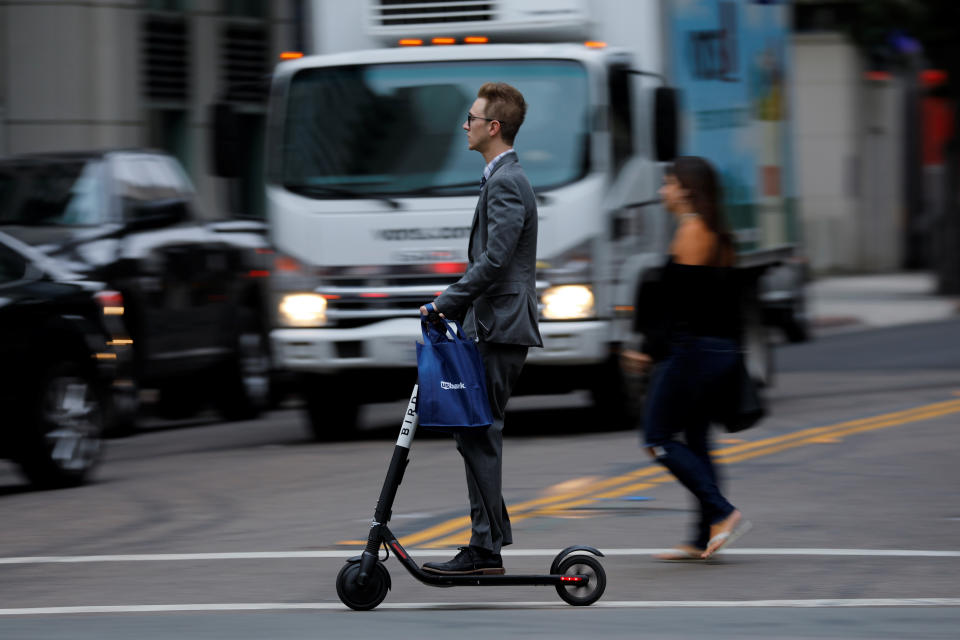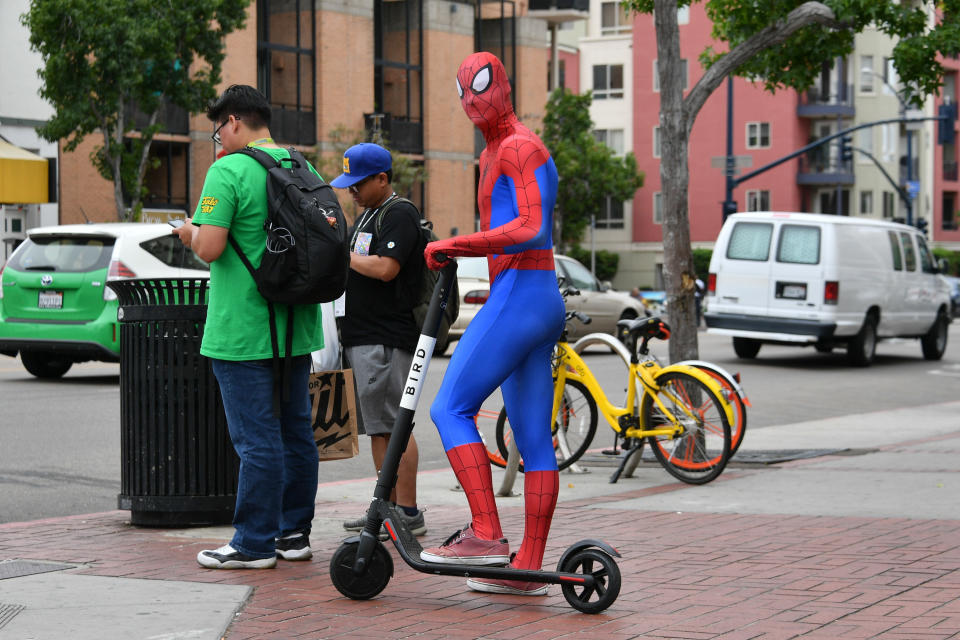Disabled San Diego residents sue over e-scooter ‘obstacle course’
A group of disabled Californians and their advocates are asking a judge to order shared ride scooter companies to remove their scooters from San Diego’s sidewalks and return money they earned by conducting business on taxpayer-funded walkways.
A man born with with no arms and one leg, a blind man, a male amputee, and a man with progressed Parkinson’s disease are plaintiffs in a federal case seeking class action certification against startup companies Bird, Lime, Razor, and the city of San Diego. The plaintiffs say defendants are denying disabled people their right to travel freely and safely on public ways.
The action, filed in connection with disability advocacy group, Disability Rights California (DRC) and the law firm Neil Dymott, alleges that the defendants are violating the Americans with Disabilities Act, California’s Municipal Code, and other laws, by failing to maintain public sidewalks, curb ramps, crosswalks, and transit stops in a way that is accessible for people with visual and mobility impairments.
Bird and Lime and scooter manufacturers are already facing lawsuits filed by non-disabled Californians who claim they sustained personal injuries and property damage from the company’s equipment and users.
‘An obstacle course they can’t navigate safely’
“When dockless scooters are left in the middle of the sidewalk and other rights of way, at points of ingress and egress, they block off access to the public rights of way,” the San Diego complaint states.

“Basically, it’s an obstacle course they can't navigate safely,” Ann Menasche, a senior civil rights attorney for DRC, said. “This taking of our public sidewalks and walkways for private profit is having a horrible impact on their safety.”
The action goes on to say that the defendants are aware that scooter riders often ride on sidewalks, which turns sidewalks into “a vehicle highway rather than a space for safe pedestrian access and use.”
“People with disabilities who wish to travel in the City using the City’s walkways are being forced to either put their physical safety at risk or just stay home,” the complaint says.
According to Menasche, as many as 150,000 disabled San Diego residents may be impacted by scooters along public walkways.
“My co-counsel estimated from his own research, there are possibly 100,000 people with mobility impairments in San Diego, and 50,000 people who are blind or have serious visual impairment,” Menasche said. “We don't know if there’s overlap with those numbers but there might be.”
Given the number of people potentially impacted by the scooters, Menasche says she thinks there’s a good chance the court will grant class certification.
“I don’t like to predict but I think it’s pretty good,” she said.
‘They’ve appropriated walkways’
The plaintiffs are asking the court to issue an order that would stop scooter companies from continuing to operate on San Diego’s sidewalks, crosswalks, curb ramps, transit stops, pedestrian crossing,s and other walkways. The complaint also asks that Bird, Lime, and Razor be disgorged of any money obtained as a result of wrongful or illegal conduct.

“What they’ve done is they’ve taken the public walkways, bus stops, and used them for their own business purposes,” Menasche said. “They’ve appropriated walkways and used them for their business to save money on things like rent, showrooms, and storage. It keeps costs way down to use the public walkways for free.”
When asked if plaintiffs intend to go after any other scooter companies not currently named in the lawsuit, Menasche said, “That I don’t know. It may depend on how things evolve.”
In the eight-count complaint, plaintiffs claim the City of San Diego is in violation of Title II of the ADA, which prohibits municipalities from excluding disabled individuals from participating in or benefitting from municipal services, programs, or activities. It also alleges the City is in violation of The Rehabilitation Act, which prohibits similar discrimination by municipalities that accept federal funding.
‘Free money from the city’
As for the scooter defendants, plaintiffs claim the companies are violating Title III of the ADA, which protects against discrimination by private companies in places of public accommodation. Plaintiffs argue that scooter companies effectively turned public walkways into private retail stores by operating their businesses on public land, and in doing so are required to remove barriers to access under the Act. The lawsuit also claims that scooter defendants are in violation of California State Code and San Diego’s Municipal Code.
“California Civil Code § 54(a) provides that “[i]ndividuals with disabilities or medical conditions have the same right as the general public to the full and free use of …sidewalks, walkways… and other public places,” the complaint states.
Yahoo Finance requested an interview and statement from San Diego’s City Attorney’s Office and did not receive a response. Bird, Lime, and Razor also could not immediately be reached for comment.
“Basically, it’s free money from the city,” Menasche said of the real estate afforded to scooter companies. “That’s what it is: Our tax dollars subsidize them.”
Pat McConahay, Communications Director for Disability Rights California (DRC), says the organization is part of a federally mandated network of advocacy groups that exist in each state.
“Every state has what they call a P&A (Protection and Advocacy), and we are the one for California,” McConahay said. While advocacy organizations like DRC are required by law, McConahay explained that DRC also brings legal actions where it finds it appropriate.
“We are not affiliated with our state government, and while we have contracts with the state we also will file lawsuits against states or governments that are not providing the services that are needed,” McConahay said.
“One of our main plaintiffs ended up hurting himself and in the emergency room because he can’t see,” Menasche said. “He doesn't want to go anywhere beyond the blind center anymore.”
Alexis Keenan is a New York-based reporter for Yahoo Finance. She previously produced live news for CNN and is a former litigation attorney. Follow her on Twitter at @alexiskweed
Read more:
How legalized cannabis changed Colorado in the past 5 years
California’s new female board mandate is ripe for constitutional challenge
Hemp entrepreneurs say big retailers unfairly dominate online ads
Lawyer: Google’s new sexual harassment policy is a ‘bait-and-switch’
Google’s search leaves users in the dark: DuckDuck GO CEO
Apple faces massive legal risk, and it’s not about iPhone demand or tariffs
Weed is legal in 3 more states — here’s what to expect from the new laws
Follow Yahoo Finance on Twitter, Facebook, Instagram, Flipboard, LinkedIn, YouTube, and reddit.
